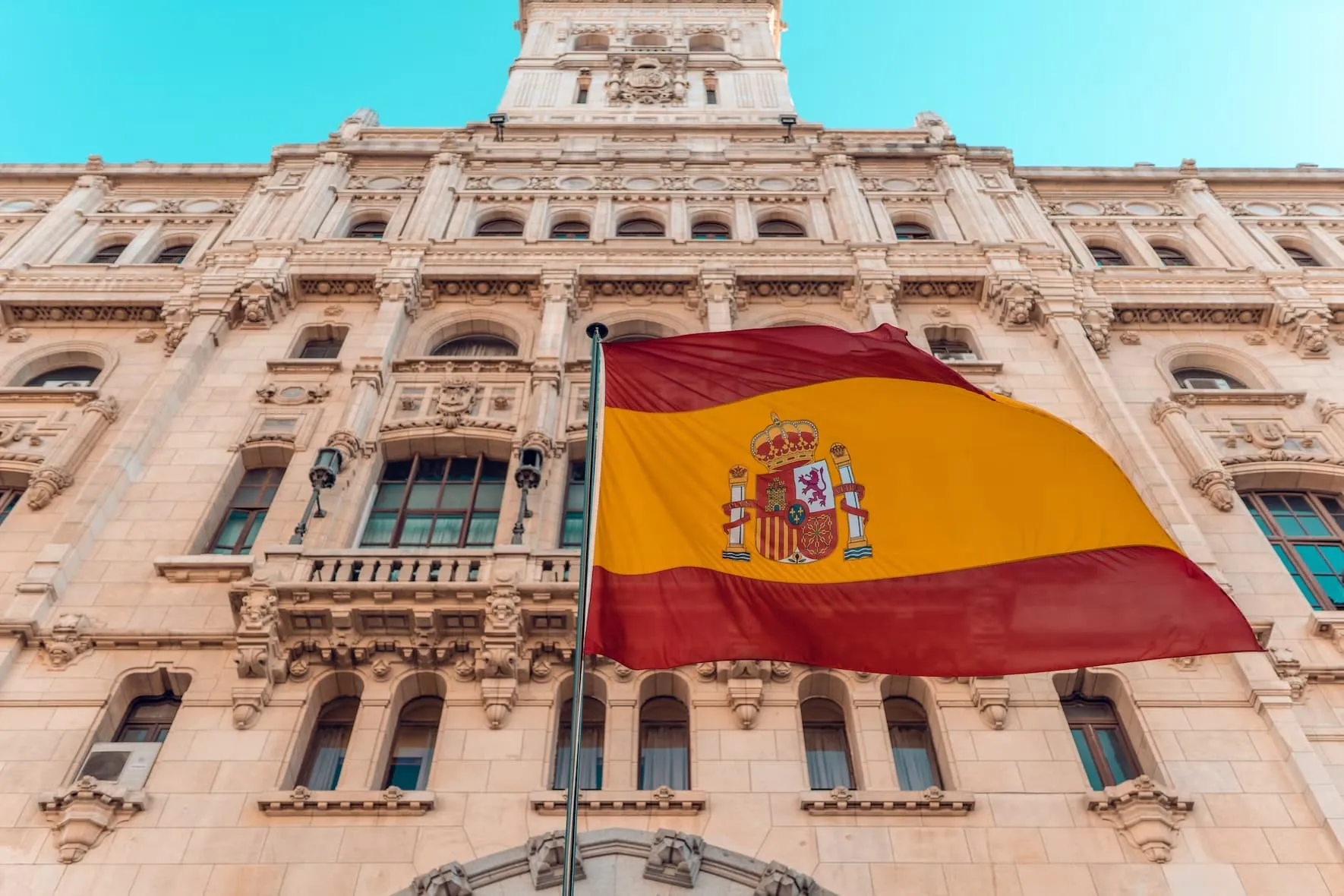Spain Self-Employed Visa: Work as an Autónomo (Freelance)
If you’re over 16 years and you’d like to work for yourself in Spain, then you might be eligible for a Spain Self-Employed Visa.
For more information about the Spain Self-Employed Visa, how to apply, including what documents to submit, and to receive bespoke advice on the process, reach out to one of our professional legal advisers today. Call us at +44 (0)333 414 9244, or contact us online today.
Request a call back from our immigration experts
Benefits of Choosing IAS‘ Spain Immigration Lawyers
When it comes to obtaining a Spain visa or permit, IAS Spain immigration lawyers are well-equipped to help you.
With IAS’ track record of successfully helping clients visit or immigrate to Ireland successfully, we can help businesses and individuals achieve their goals.
Our dedicated immigration lawyers provide our services through a comprehensive and personalised approach. With IAS, you enjoy:

Expert support from an experienced immigration lawyer dedicated to your success



Support in gathering supporting documents and completing a high-quality application.



Confidence that your case is being handled by an experienced team.



In-house document checks done by lawyers who are accredited by the IBA in Madrid and Seville.
Services we Provide
Overview of the Self-Employed Visa in Spain
The Spain Self-Employed Visa is a special work visa that lets a non-EU citizen work as a freelance person or autónomo in Spain. With a Spain Self-Employed Visa, you can work as an independent contractor for clients or as a sole trader in Spain.
The Spain Self-Employed Visa is also an option for people who want to start or buy a business in Spain but are ineligible for the Residency Visa for Entrepreneurs and Business Activity (REM).
Eligibility Criteria for the Spain Self-Employed Visa
To be eligible for a Spain Self-Employed Visa, you should:
- Not be a citizen of the European Union (EU) or EFTA
- Be older than 16 years
- Not an illegal Spain immigrant
- Have no criminal record


Difference Between an Entrepreneur Visa and a Self-Employed Visa
A foreign national who wishes to set up his own business in Spanish territory has two options.
- The Self-Employment Visa
- The Entrepreneur Visa
The Entrepreneur Visa is designed for foreigners who want to start a wholly new, entrepreneurial business with a strong technological foundation that will be of great economic relevance to Spain.
Therefore, if your company will create a lot of jobs and drive economic activity, you may have to apply for an Entrepreneur Visa.
But if you want to start a small business that already exists in Spain like virtual assistance, the self-employment/autónomo route will be the best option.
To operate as a self-employed person in Spain, you must first obtain the following:
- A work and residence permit (This is not the same permission needed to work as an employee for a firm). The residence permit will be granted together with the work permit.
- A self-employment work and residence visa.
As a result, the visa process is divided into two stages.
First Stage: Obtaining the Self-Employed Work and Residence Permit
This part of the Spain Self-Employed Visa process happens in your country of residence. It permits you to carry out business operations as a self-employed sole trader in Spain.


Documents Required For the Spain Self-Employed Work and Residence Permit
To prove that you intend to work legitimately as an autonomo in Spain, you will have to provide the following documents for your work and residence permit.
- A Business Plan: This is one of the most important documents to present for your permit. Your business plan determines whether the authorities will consider your business lucrative or not. It will also determine the legality of your business.
- Your business plan should contain any vital information about the activities you wish to carry out in Spain. It should state what value it brings to the market, who your competitors are (if any), how you’ll finance it, who your customers are, and the expected returns.
- Also, state what jobs you will create with your business if any.
Remember that documents written in another language must be accompanied by an approved translation into Spanish.
- A certificate from Spain’s Self-Employed Workers Association (website in Spanish) stating that the project is viable
- Application form for an initial residence and self-employed work permit: Each applicant must fill out all sections of the EX-07 form and sign two visa application forms. One of the applicant’s parents must sign the application if the applicant is a minor.
- Passport: A photocopy of each page of your current, valid passport or travel document.
- Appropriate activity permits and licenses: If your business requires permits, be sure to find out all of them. You’ll need to add a list of them to your application, along with how far you’ve gone in getting them. If you already have some licenses, include certified copies in your application. Applications must be approved by the relevant organizations.
- Professional training and qualifications: You will be required to prove that you have the required qualifications/training to develop the business you intend to do in Spain, especially if it is a professional practice. You will submit the originals and photocopies of the certificates or licenses.
- Foreign papers must be legalized or apostilled and, if required, accompanied by an official translation into Spanish.
- Financial means: You will need to show that you have sufficient funds to establish and grow your business. There is no statutory minimum or maximum amount. The amount you must show will be largely determined by the sort of business you establish and its requirements, as some have far larger initial fixed-cost obligations than others.
- To show that you are financially competent, you will submit an original and a copy of the documents accrediting that you have sufficient financial means to carry out the planned investment. These documents can also be papers showing that financial or other institutions have committed to supporting you.
Fees For the Spain Self-Employed Work and Residence Permit
To pay the fees required for this application, the applicant must complete all the fields and sign two copies of form 790 code 052, ticking box 2.1 (initial temporary residence permit) and form 790, code 062, ticking box 1.5 (self-employed work permits).
You can also pay the application fee online, through the links to the forms on the immigration portal. Here, you will need to attach the proof of payment from the immigration webpage. Nationals of Ibero-American nations, Filipinos, Andorrans, Equatorial Guineans, Sephardim, children and grandchildren of Spanish-born people, and foreigners born in Spain do not have to pay for self-employed work licenses.
If a work permit is filed for in the Autonomous Community of Catalonia, the cost must be paid directly to that Autonomous Community.
The Consular Office may ask for further information or documentation while evaluating an application, and it may even invite the applicant in for a face-to-face meeting.
Application Process for a Self-Employed Work and Residence Permit
Once you have obtained all of the necessary paperwork, you must send it in person to the Spanish consulate in either your place of birth or the nation where you are currently residing lawfully.
If the applicant is less than 18 years (a minor), then one of their parents should submit the documentation. You will require an appointment at the Consulate too
After submission, the Consular Office will send your dossier to the appropriate Foreign Nationals’ Office and give you a copy of the application form (form EX-07) and, if necessary, the receipts for the fee payments (forms 790-52 and 790-62).
Processing Time for a Self-Employed Work and Residence Permit
The Foreign Nationals Office will have three months to decide, starting the day after the application is submitted.
If your application for a work and initial residence permit is approved, you will be invited to submit a Self-Employed visa application to the Consular Office.
However, if the decision is not favorable, the applicant may file an appeal with the Consular Office within one month following the day you received the notification. You can also seek a judicial review at the High Court Justice of Madrid within two months beginning the day after receiving news of the permit denial or the dismissal of the reconsideration appeal.
What is the Duration of the Work and Residence Permit?
The initial period of this residence permit is one year, as you will receive a temporary card with your initial application. The work permit may also be restricted to a certain activity and location.
You can renew the permit once this first year ends. As long as you continue to meet all the requirements, such as living in Spain for at least 183 days each year.
You will be eligible for permanent residency after 5 years of having the temporary residence visa. And you may be eligible for Spanish citizenship after ten years of lawful residency (temporary or permanent). To become a Spanish citizen, you must renounce your previous nationality, be financially stable, have no criminal record, attend an interview, and show your level of integration into Spanish society, such as knowledge of the Spanish language, culture, and values
It should be noted that natives of the Philippines, Andorra, Spanish-American nations, Equatorial Guinea, Portugal, and Jews of Sephardic heritage may be eligible for citizenship after two years of lawful presence.
Second Stage: Obtaining a Self-Employed Work Visa
Once you’ve successfully applied and gotten the Self-Employed work and residence permit, you will be invited to submit a visa application.


Documents Required For the Spain Self-Employed Work Visa
- National visa application form: You must fill out and sign a visa application form. If you’re a minor, then your parents must sign on your behalf instead.
- Valid passport: You will be required to submit the original and a photocopy of the page or pages of your passport containing your biometric data. The passport must be valid for at least four months and have two blank pages. Passports issued more than ten years ago will be refused.
- Criminal record certificate: This is to check if you’ve been involved in criminal activities before applying to work in Spain. The Self-Employed visa requires applicants of legal age to provide both the original and a copy of the criminal record check certificate(s) issued by their country or countries of residence for the last 5 years. Please note that all documents in foreign languages must be legalized or apostilled and, where applicable, must be submitted with an official translation into Spanish.
- Photograph: A recent passport-size, color image shot against a light background, looking forward, without dark or reflecting spectacles or other clothing that obscures the oval of the face.
- Medical certificate: You must prove that you do not suffer from any disease included in the International Sanitary Regulation of 2005, which can affect the public health of the country. To do this, you must submit an original and a copy of a medical certificate declaring that you don’t suffer from the diseases listed in that law.
- Proof of residence in the consular district.
- Proof of the representative’s identity and capacity: If the applicant is a minor, they must provide originals and submit copies of one of their parents’ identity documents or passports, as well as the document proving kinship.
The Consular Office may ask for further information or documentation while evaluating an application, and it may even invite the applicant in for an interview.
How Much is the Self-Employed Visa Fee in Spain?
The Self-Employed visa fee is equivalent to 80 euros. However, the rates may vary for citizens of Australia, Bangladesh, Canada, the United States of America, and the United Kingdom. In these circumstances, be sure to contact an immigration expert for advice.
Application Process for a Spain Self-Employed Visa
Self-Employed visa applications must be submitted in person or by a parent if you’re a minor. You must apply for a visa within one month after the day you were notified that you’ve been granted an initial residence and self-employed work permit.
Your Self-Employed work visa application must be submitted in person at the Consular Office. You’d need an appointment for this purpose.
After submission, the Consular Office will provide you with proof of receipt of the application with a code for you to keep track of the status of the dossier through the Consular procedure tracker.
What is the Processing Time for a Self-Employed Work Visa?
Legally, the Consular Office is required to decide on your application within one month starting from the day after the application is submitted. However, this period may be extended if an interview or more papers are necessary.
The visa must be obtained in person by the applicant or their representative (if the applicant is a minor) within a maximum of one month from the day the application is granted. The Consular Office will advise you on how to get back your passport and any other original papers you previously submitted.
Visa refusals will always be communicated in writing, outlining the reasons for the decision.
If you feel your visa is unduly rejected, You may file an appeal for reconsideration with this Consular Office within one month of the day you got informed of the rejection. You can also apply for a judicial review with the High Court Justice of Madrid during the 2 months beginning the day after the applicant gets news of the visa rejection or the dismissal of the reconsideration appeal.
IAS also offers visa appeal assistance. Our skilled immigration attorneys can guide you through the appeals process, including which papers to submit and how to file them.
What Is The Validity And Duration Of The Self-Employed Work Visa?
The Self-Employed work visa is valid for 90 days.
You must register with the Social Security system within three months of your arrival in Spain, and before beginning your self-employment. You must also apply for a Foreigner Identity Card at the Foreign Nationals’ Office or the Police Station within one month after your Social Security registration.
Can I Extend My Self Employed Visa in Spain?
Yes, it is possible to extend the Self-employed visa in Spain. You will be able to apply to the Spanish immigration authorities in order to extend your visa.
You must demonstrate that you are still working as a self-employed individual and that you have sufficient financial resources in your possession. You may also need to provide details of any changes to your work or business statuses while you’ve been in Spain.
Applications for extensions can typically be made once every two years.
Taxes on Self employed Visa in Spain
There are a few tax implications for self-employed individuals in Spain that applicants for this visa must be aware of.
Self-employed income tax in Spain is known as Impuesto sobre la Renta de las Personas Físicas (IRPF). If you are going to spend over 183 days resident in Spain, you will become a tax resident and thus liable to pay tax.
Generally speaking, you will pay more tax on your self-employed income the more you earn. The exact figure will vary based on your income bracket and the Spanish region which you live in, but it will be around 19 to 47%.
You may be able to claim deductions on the tax you pay for certain expenses such as business maintenance costs, social security contributions, certain health insurance premiums, etc.
Freelancers may also be liable for VAT in Spain, which is 21% per annum.


How Can IAS Help?
The Self-Employed visa is a lucrative work visa in Spain. Therefore, the application process can get complicated and unnecessarily prolonged.
If you’re over 16 years and you’d like to work for yourself in Spain using the Spain Self-Employed Visa, IAS can help.
We offer professional immigration services to individuals navigating the complexities of the Spanish immigration system. Our empathetic and experienced lawyers will assist you in your Spain Self-Employed Visa process or any immigration pathway you choose instead.
We are also available if you’re unsure which visa to choose, and need help figuring it out.
For more information about the services we provide and how we can help you, reach out to a member of our team today. Call us at +44 (0)333 414 9244, or contact us online.
Table of Contents
Table of Contents will appear here.Legal Disclaimer
The information provided is for general informational purposes only and does not constitute legal advice. While we make every effort to ensure accuracy, the law may change, and the information may not reflect the most current legal developments. No warranty is given regarding the accuracy or completeness of the information, and we do not accept liability in such cases. We recommend consulting with a qualified lawyer at Immigration Advice Service before making any decisions based on the content provided.
Frequently Asked Questions
The answer is yes. However, you must apply for the Self-Employment work and residence permit within 60 days of the expiry date of your non-lucrative visa. Or if you have already renewed your non-lucrative residence permit, you may apply at any time.
You cannot change to a Self-Employment visa during your tourist stay in Spain. You must begin the application process at the Spanish Consulate in your place of origin.
It depends on the income earned. The more you earn, the more you’re taxed. As such, you can pay from 19 to 45% in tax. Tax may also vary across the country.
It may be advisable to register as a company if you are earning around $100,000 annually, that way your tax may be reduced.


What our clients are saying
How our UK Immigration Lawyers can help
At the Immigration Advice Service our lawyers specialise in a wide range of UK visas, nationality and asylum applications and have represented clients in various successful complex and high-profile cases.















